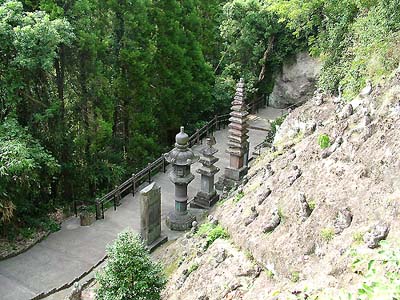5: Isho no aidayokushin omawazu - To always be detached from desires or wants. 6: Waga koto ni oite, kokai wo sezu - Never have regrets about oneself or what you have done. This means you are the one that has to come to terms with yourself. Your confession in life is to yourself. There should be no regret in human lives. So is there a way of being able to not regret anything? It would be impossible to say that one cannot have any regret at all. But there is a way towards this. This is when one can reform oneself and go out into this exceedingly big world. To get the know that world without any regrets. Musashi writes, In order to express this Gorin no Sho is based on, The way to heaven and Kannon [1] as a mirror. This is what you in your mind when you make a confession to yourself.
|
So what is meant by, As a mirror? Zendo Daishi (613 - 681 CE), one of the Seven Patriarchs of Jodo-Shinshu) wrote, "A lesson is like a mirror". This means not seeing an image of yourself on that mirror.
|
However all these thoughts manifest themselves as thinking over regret and being ashamed. In our Cycles of Life[2]. It could happen to you or anyone. It is all based on each others world. [1] Kannon the Goddess of Mercy embodies compassion and is one of the most widely worshiped divinities in Japan and mainland Asia. Kannon literally means "watchful listening," which could be loosely translated as "the one who sees/hears all." This is indeed the task of the compassionate Kannon Bodhisattva -- to witness/listen to the prayers of those in difficulty in the earthly realm, and to help them achieve enlightenment. [2] This refers to the Six ways of Transmigration. Basically the Buddhist view of dying, death and life after death follows the Buddhist teachings. It may be simply described as follows:
|
 |
Due to ignorance and attachment sentient beings constantly engage in self-centered activities. Consequently, by the force of such activities, called karma, they are helplessly engulfed in transmigration within the six realms of suffering. These six realms are: heavens, asuras, humans, animals, hungry ghosts, and hells. Through understanding the Buddhist teaching and realizing their significance by devoted practice, one may achieve transcendence from this cycle of transmigration. The transcendental states are classified as Sravakas, Pratyeka-buddhas, Bodhisattvas and Buddhas. One may achieve transcendental states in this or some future life. The source of making a confession means that you must really have a realisation of of yourself. A true awakening. You realise Go Gyaku Ju Ako and that it is connected with Buddha to become Nyo. |
So all these things to think over, the regrets, the being ashamed don't really mean all that much, they don't have that much importance to others. What really matters is yourself. Therefore the source of making a confession is that, You through yourself in front of Buddha should apologise truly from the heart then be consoled by it. We also call this, " A change back to the very beginning". Up to now my "change back" was narcissistic and done all on my own. But at least it was a start. "When I made a confession to myself, my beginning came. Musashi wrote, The world to heaven and to Kannon and this world are in existance.
|
